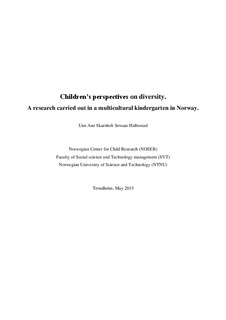| dc.description.abstract | This master thesis is written based on a research about children’s perspectives on diversity carried out in a multicultural kindergarten in Norway over a six week period. Theories and methods used were chosen based on the main thesis question and research questions. The main thesis question is closely connected to the topic of this master thesis and is: What are children’s perspectives on diversity in a multicultural kindergarten in Norway? The research questions are: How do children experience and reflect on diversity in a multicultural kindergarten? Does going to a multicultural kindergarten influence children’s understanding of cultural differences? and How are the children’s own culture in the kindergarten influenced by the diversity? The participants’ age were also considered when choosing methods which are qualitative multiple methods. These are: one to one interviews and focus group interviews with the use of images, participant observations, drawing activity and a guide tour. Ethical considerations were taken, although some ethical issues were still met. The theory presented and used in this thesis are: theoretical concepts in the sociology of childhood, which are beings rather than becomings, childhood as a structural form and agency. Factors of diversity: culture, language and gender, was included represented as one culture or many? first language and bilingualism and gender identities. The concept of child culture was also used, and discussed whether it is different than adult culture, and the difference between child culture for children, with children and by children.
This master thesis answers how children’s perspectives on diversity are in a multicultural kindergarten in Norway. It answers how children experience and reflect upon diversity in a multicultural kindergarten, that the children did not use the words: diversity, culture, religion, appearance and ethnicity, and did not reflect so much over this. Although they were used to hearing different languages and that some children needed a special type of food, they were rather more conscious about gender. Friendships were important to the children, and they played mostly with other children, and cross culture, religion, language, appearance, ethnicity and gender. This master thesis shows that going to a multicultural kindergarten influence children’s understanding of cultural differences, in that way that the diversity become what is normal to the children. It also shows that children’s’ own culture in the kindergarten were influenced by more than the cultural diversity, but that it also were influenced by the Norwegian culture, by playing material and by factors of child culture produced by adults for children, in addition to the diversity. | nb_NO |
